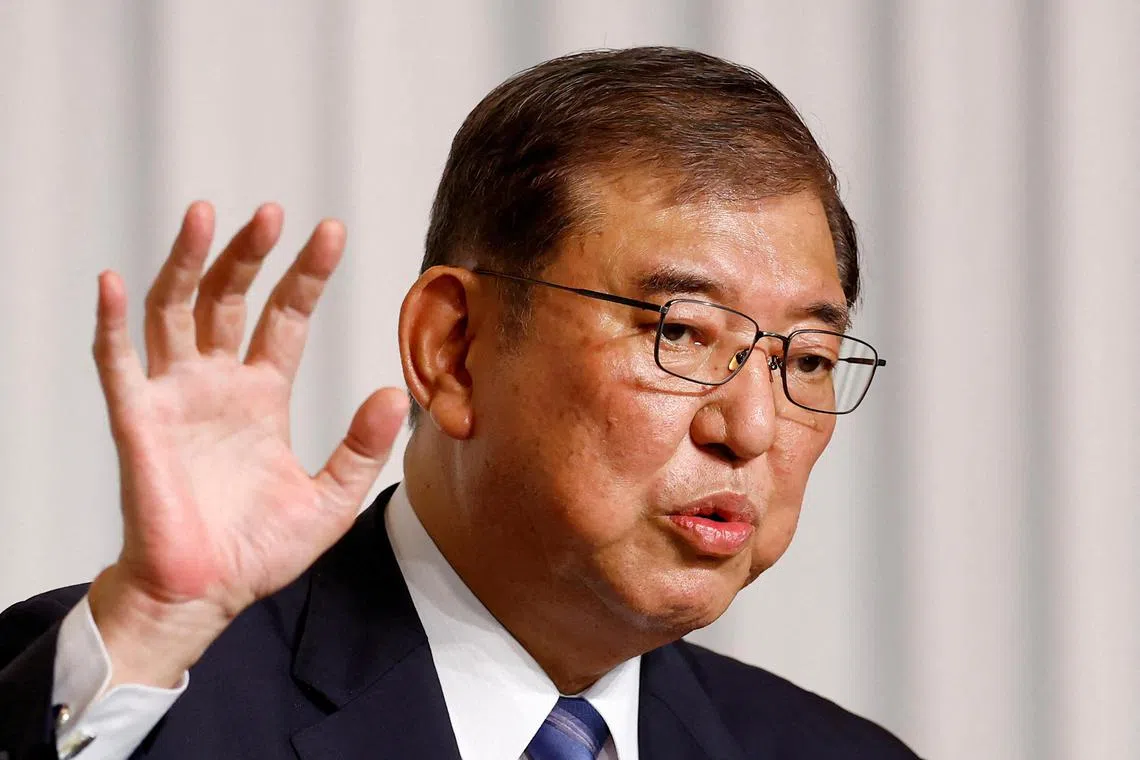Japan’s next PM aims for snap election even as stocks sink
Sign up now: Get insights on Asia's fast-moving developments

Mr Shigeru Ishiba, who is set to be appointed as premier on Oct 1, supports the Bank of Japan’s drive to hike interest rates and has said “there is room” to raise corporate levies.
PHOTO: REUTERS
TOKYO – Japan’s incoming prime minister Shigeru Ishiba said on Sept 30 he aimed to call a snap election for Oct 27, even as equities plunged on a strong yen and fears that tax hikes are on the cards.
Mr Ishiba, who is set to be formally appointed as premier on Oct 1 after winning the leadership of the ruling party
The leadership contest for the Liberal Democratic Party (LDP), which has governed almost uninterrupted for decades, went down to the wire on Sept 27, with right-winger Sanae Takaichi tipped to win when markets closed.
With Ms Takaichi a fan of former prime minister Shinzo Abe’s unorthodox “Abenomics” policies of ultra-low interest rates and tax cuts, the prospect of her winning sent stocks higher and the yen lower.
Ms Takaichi, an arch-nationalist, would also have been the first woman prime minister in a country where men still dominate politics and business.
Mr Ishiba, 67, is a fierce critic of Mr Abe and his last-gasp victory – on his fifth attempt – sent the yen climbing to around 142 per US dollar from around 146.50. Investors dumped stocks on Sept 30, with exporters among the worst hit.
The Nikkei index closed down 4.8 per cent, with Toyota tumbling 7.6 per cent and real estate company Mitsui Fudosan off 8.7 per cent.
Mr Ishiba confirmed on Sept 30 media reports that he aimed to call a snap election for Oct 27, saying it was “important for the new government to be judged by the people as soon as possible”.
LDP elders are banking on Mr Ishiba, a self-confessed defence “geek” fond of making model ships and planes, to boost the party’s popularity. Its poll ratings have fallen sharply under outgoing Premier Fumio Kishida, hit by a damaging party slush fund scandal and anger over rising prices.
Defence ties
Mr Ishiba vowed on Sept 27 to restore confidence in the LDP after the scandal and to shore up defence ties among neighbours rattled by recent Chinese actions.
He is considering appointing as finance minister Mr Katsunobu Kato, a former chief Cabinet secretary who ran in the LDP leadership race, media reports said.
Mr Gen Nakatani, a veteran former defence minister, will return to his old job, while Mr Takeshi Iwaya, another former defence minister, will come in as foreign minister, the reports said.
Mr Kishida pledged to double defence spending and deepen military cooperation with the United States and other allies in the region rattled by China’s rise and an unpredictable North Korea.
Mr Ishiba backs the creation of an “Asian Nato” and has said Japan should respond more strongly to Chinese or Russian breaches of its airspace or waters, as has happened repeatedly in recent weeks.
But questions remain over how the government plans to pay for the upgrade and also find enough recruits for the military among Japan’s shrinking population.
Mr Taro Saito, senior economist at NLI Research Institute, told AFP that Mr Ishiba had so far focused on how to improve public finances in Japan, which has one of the world’s highest debt mountains.
“He seems not so interested in policies to boost economic growth, although what is most important for Japan is low growth rather than fiscal health,” Mr Saito said.
Chief Cabinet Secretary Yoshimasa Hayashi, who is reportedly set to remain under Mr Ishiba, declined to comment on Sept 30 on the fall in stocks, but said the government would “make judgments with calm heads”.
“We will continue closely watching trends in financial markets at home and abroad with a sense of vigilance and, while cooperating closely with the Bank of Japan, we will do our best in management of the economy and finance,” he said. AFP


